
orbit
An adaptable, open-source context-aware inference engine designed for privacy, control, and independence from proprietary models.
Stars: 233
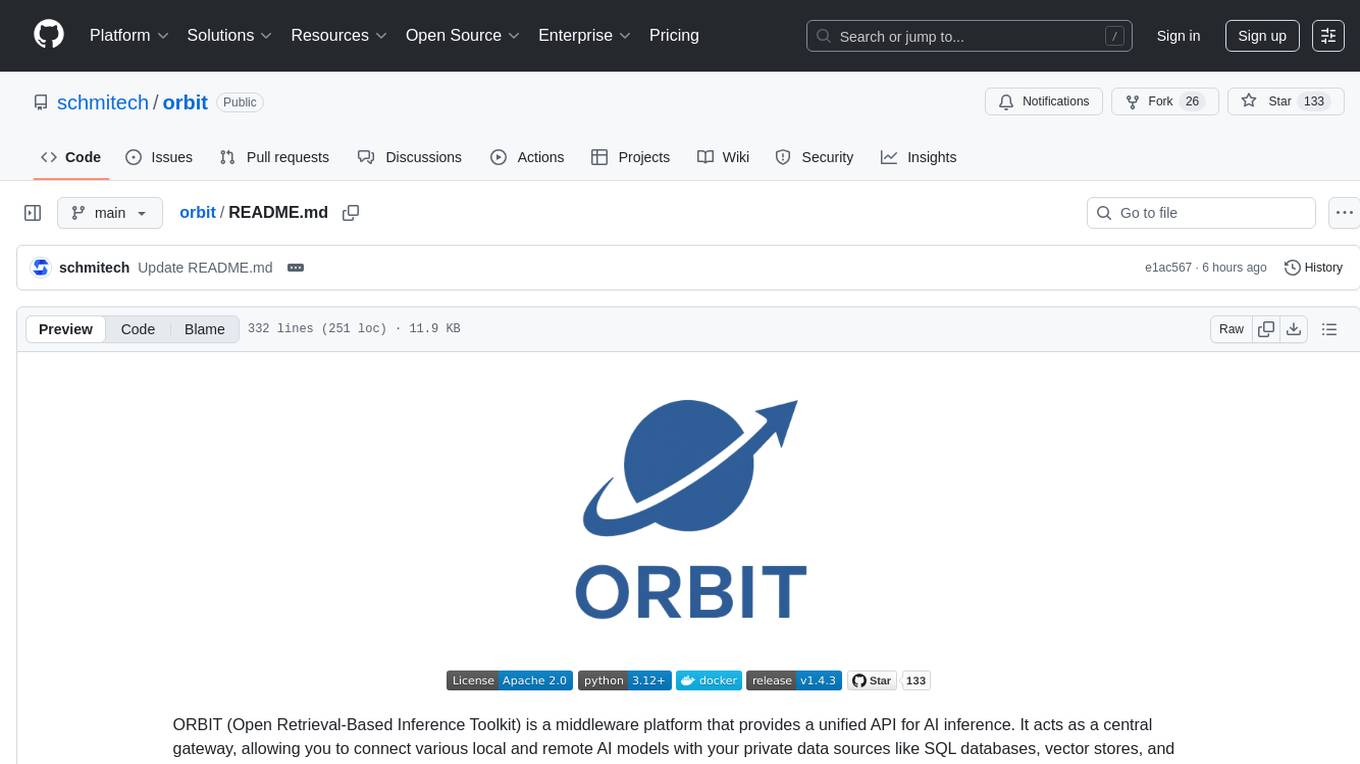
ORBIT (Open Retrieval-Based Inference Toolkit) is a middleware platform that provides a unified API for AI inference. It acts as a central gateway, allowing you to connect various local and remote AI models with your private data sources like SQL databases, vector stores, and local files. ORBIT uses a flexible adapter architecture to connect your data to AI models, creating specialized 'agents' for specific tasks. It supports scenarios like Knowledge Base Q&A and Chat with Your SQL Database, enabling users to interact with AI models seamlessly. The tool offers a RESTful API for programmatic access and includes features like authentication, API key management, system prompts, health monitoring, and file management. ORBIT is designed to streamline AI inference tasks and facilitate interactions between users and AI models.
README:
Open Retrieval-Based Inference Toolkit
Stop rewriting your app every time you switch LLMs. ORBIT unifies 20+ AI providers with your databases, vector stores, and APIs—all through one self-hosted gateway.
Ship faster. Stay portable. Keep your data private.
⭐ Help ORBIT grow: Star + watch the repo so other builders can find it and we can keep funding new adapters, tutorials, and sandbox credits.
The Problem: Building AI apps means choosing between vendor lock-in, complex integrations, and privacy concerns.
- Complex RAG: Connecting databases, vector stores, and APIs requires custom glue code
- Privacy concerns: Sending sensitive data to third-party APIs
- Fragmented tools: Different SDKs, auth methods, and APIs for each provider
The Solution: ORBIT is a self-hosted, unified gateway that gives you:
✅ Portability — Switch LLM providers with a config change, not code changes
✅ Built-in RAG — Connect SQL databases, vector stores, and APIs through natural language
✅ Full-Duplex Voice — Real-time speech-to-speech conversations with natural dynamics
✅ Data sovereignty — Keep your data on your infrastructure
✅ One API — OpenAI-compatible interface that works with any provider
✅ Production-ready — Rate limiting, security, monitoring, and fault tolerance built-in
Who it's for: Developers building AI applications who want flexibility, privacy, and control without the complexity of managing multiple integrations.
- Questions? Open an issue
- Updates: Check the changelog
- Maintained by: Schmitech.ai
Open-source traction is the fuel that keeps ORBIT's sandbox, docs, adapters, and demos free for everyone.
- ⭐ Star + watch the repo to surface ORBIT in GitHub search and get notified when a new release drops.
- ✉️ Share the sandbox or demo video with the teammate who's still wiring SDKs by hand.
- 📣 Tell us what to build next in Discussions; upvotes there help us prioritize the roadmap you care about.
- Unified API for 20+ AI providers – Swap between OpenAI, Anthropic, Gemini, Groq, DeepSeek, Cohere, Mistral, AWS Bedrock, Azure OpenAI, Together, xAI/Grok, and any local stack (Ollama, llama.cpp, vLLM, Hugging Face) via config only.
- Full-duplex speech-to-speech – Build voice assistants with real-time, bidirectional audio using NVIDIA's PersonaPlex integration. Natural conversations with interruptions and backchannels—no STT→LLM→TTS cascade needed.
- Adapters for every data shape – Intent + QA retrievers cover Postgres/MySQL/DuckDB/SQLite, MongoDB, Elasticsearch, HTTP APIs, and the major vector stores (Chroma, Qdrant, Pinecone, Milvus, Weaviate).
- Batteries included – Per-key RBAC, rate limits/quotas, audit logging (SQLite or MongoDB + optional Elasticsearch), content safety providers, retries/circuit breakers, and observability dashboards ship by default.
- Multimodal + widgets – Ship chat UIs via orbitchat CLI, React widget, orbit-mobile (iOS), or OpenAI-compatible API; render charts, math, and audio/video streams out of the box.
- Zero lock-in deployments – Try it in the hosted sandbox, run a Docker preset in under 60 seconds, or install the full server with TLS + GPU detection when you're ready for production.
No more glue code—connect everything through adapters and declarative config.
Inference & embeddings
- LLM providers: OpenAI, Anthropic, Google Gemini/Vertex, Groq, DeepSeek, Mistral, Cohere, AWS Bedrock, Azure OpenAI, Together, xAI, OpenRouter, IBM watsonx, plus local engines (Ollama, vLLM, llama.cpp, Hugging Face).
- Embeddings & rerankers: OpenAI, Jina, Cohere, Mistral, Ollama, llama.cpp, and any custom GGUF via the embeddings service.
- Vision/speech: Gemini, OpenAI, Anthropic, plus audio adapters documented in
docs/audio/. - Speech-to-speech: Full-duplex voice with PersonaPlex—real-time bidirectional audio, interruption handling, and backchannels.
Data & knowledge sources
- SQL + analytics: PostgreSQL, MySQL, SQL Server, DuckDB, SQLite, and intent-based adapters for customer schemas.
- NoSQL & search: MongoDB aggregation pipelines, Elasticsearch, Redis JSON/hashes.
- Vector stores: Chroma, Qdrant, Pinecone, Milvus, Weaviate (with QA + intent specializations).
- Files & APIs: PDF/Markdown/CSV ingestion, HTTP/REST connectors, and composite adapters that orchestrate multiple sources with guardrails.
- Infra glue: Redis caching, MongoDB or SQLite backends, optional Elasticsearch auditing.
Try the hosted ORBIT API with no setup: send a chat request and get a streaming-style response. Use the default key and any session ID for quick testing.
Request (OpenAI-compatible /v1/chat):
curl -X POST https://orbit.schmitech.ai/v1/chat \
-H 'Content-Type: application/json' \
-H 'X-API-Key: default-key' \
-H 'X-Session-ID: test-session' \
-d '{
"messages": [{"role": "user", "content": "Hello, what is 2+2?"}],
"stream": false
}'Response (response holds the reply; sources and metadata are optional):
{
"response": "Sure thing! ✨ 2 + 2 equals **4**.\n\nIf you'd like, we can explore more math fun—like how addition builds the foundation for multiplication, or some cool number tricks. What's next on your curiosity list?",
"sources": [],
"metadata": {
"last_detected_language": "en",
"last_detected_language_confidence": 1.0,
"processing_time": 0.0,
"pipeline_used": true
}
}The ORBIT Sandbox offers interactive examples for adapters, prompts, and capabilities.
See the ORBIT API Reference (ReDoc) for full API docs.
docker pull schmitech/orbit:basic
docker run -d --name orbit-basic -p 5173:5173 -p 3000:3000 schmitech/orbit:basic- Auto-detects CPU/GPU via
ORBIT_PRESET=auto(override withsmollm2-1.7b-gpuor-cpu). - Includes ORBIT server, orbitchat UI, and an Ollama preset so you can chat instantly.
- More options live in docker/README.md.
- Prereqs: Python 3.12+, Node 18+, npm, and any AI-provider keys (OpenAI, Anthropic, Cohere, Gemini, Mistral, etc.).
- Optional deps: MongoDB, Redis, and a vector DB (Chroma, Qdrant, Pinecone, etc.).
curl -L https://github.com/schmitech/orbit/releases/download/v2.4.0/orbit-2.4.0.tar.gz -o orbit-2.4.0.tar.gz
tar -xzf orbit-2.4.0.tar.gz && cd orbit-2.4.0
cp env.example .env && ./install/setup.sh
source venv/bin/activate
./bin/orbit.sh start && cat ./logs/orbit.log- To use local models with Ollama, first install it:
curl -fsSL https://ollama.com/install.sh | sh, then pull a model such asollama pull granite4:1bor another of your choice. - Default adapters live in
config/adapters/passthrough.yamlandconfig/adapters/multimodal.yaml; updateconfig/ollama.yamlfor model changes. - Visit
http://localhost:3000/dashboardto monitor the ORBIT server.
git clone https://github.com/schmitech/orbit.git
cd orbit && cp env.example .env
./install/setup.sh && source venv/bin/activate
./bin/orbit.sh start && ./bin/orbit.sh key create- Bring your own API keys (OpenAI, Anthropic, Cohere, Gemini, Mistral, etc.).
- Works great with Ollama, vLLM, llama.cpp, Redis, MongoDB, and vector DBs.
- Check logs via
tail -f ./logs/orbit.logand openhttp://localhost:3000/dashboard.
-
orbit-chatCLI:pip install schmitech-orbit-client && orbit-chat --api-key <KEY> -
React web app:
npm install -g orbitchat && orbitchat --api-url http://localhost:3000 --api-key <KEY> --open - Mobile app (iOS): Native-feeling chat via orbit-mobile (React Native/Expo)—conversation list, streaming, markdown, light/dark theme.
-
Node SDK:
npm install @schmitech/chatbot-apiand stream responses in TypeScript/JavaScript apps. -
OpenAI-compatible API: Point the official
openaiPython client atbase_url="http://localhost:3000/v1"to reuse existing code.
Using the
orbit-chat CLI. Run orbit-chat -h for options.
- Installation guide
- Configuration reference
- Authentication & API keys
- RAG adapters
- Voice & audio adapters
- Roadmap
- Contributing & Code of Conduct
- Open an issue or discussion.
- Say hi on Schmitech.ai.
Apache 2.0 – see LICENSE.
For Tasks:
Click tags to check more tools for each tasksFor Jobs:
Alternative AI tools for orbit
Similar Open Source Tools

orbit
ORBIT (Open Retrieval-Based Inference Toolkit) is a middleware platform that provides a unified API for AI inference. It acts as a central gateway, allowing you to connect various local and remote AI models with your private data sources like SQL databases, vector stores, and local files. ORBIT uses a flexible adapter architecture to connect your data to AI models, creating specialized 'agents' for specific tasks. It supports scenarios like Knowledge Base Q&A and Chat with Your SQL Database, enabling users to interact with AI models seamlessly. The tool offers a RESTful API for programmatic access and includes features like authentication, API key management, system prompts, health monitoring, and file management. ORBIT is designed to streamline AI inference tasks and facilitate interactions between users and AI models.
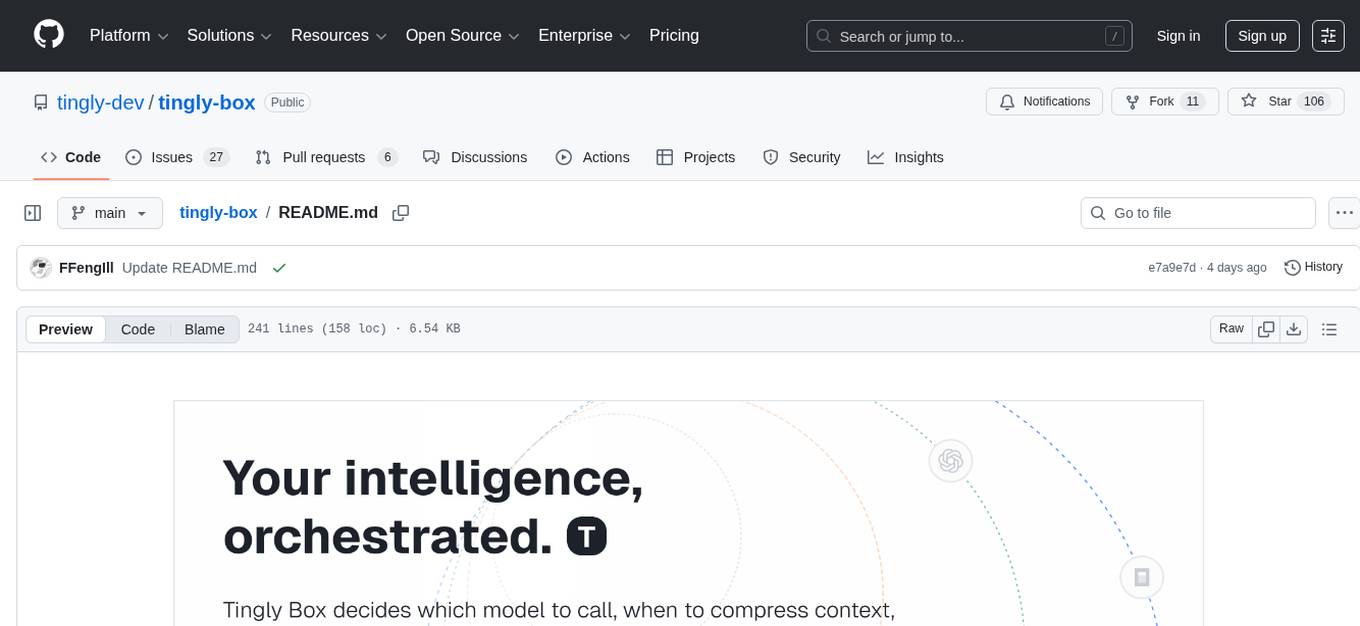
tingly-box
Tingly Box is a tool that helps in deciding which model to call, compressing context, and routing requests efficiently. It offers secure, reliable, and customizable functional extensions. With features like unified API, smart routing, context compression, auto API translation, blazing fast performance, flexible authentication, visual control panel, and client-side usage stats, Tingly Box provides a comprehensive solution for managing AI models and tokens. It supports integration with various IDEs, CLI tools, SDKs, and AI applications, making it versatile and easy to use. The tool also allows seamless integration with OAuth providers like Claude Code, enabling users to utilize existing quotas in OpenAI-compatible tools. Tingly Box aims to simplify AI model management and usage by providing a single endpoint for multiple providers with minimal configuration, promoting seamless integration with SDKs and CLI tools.
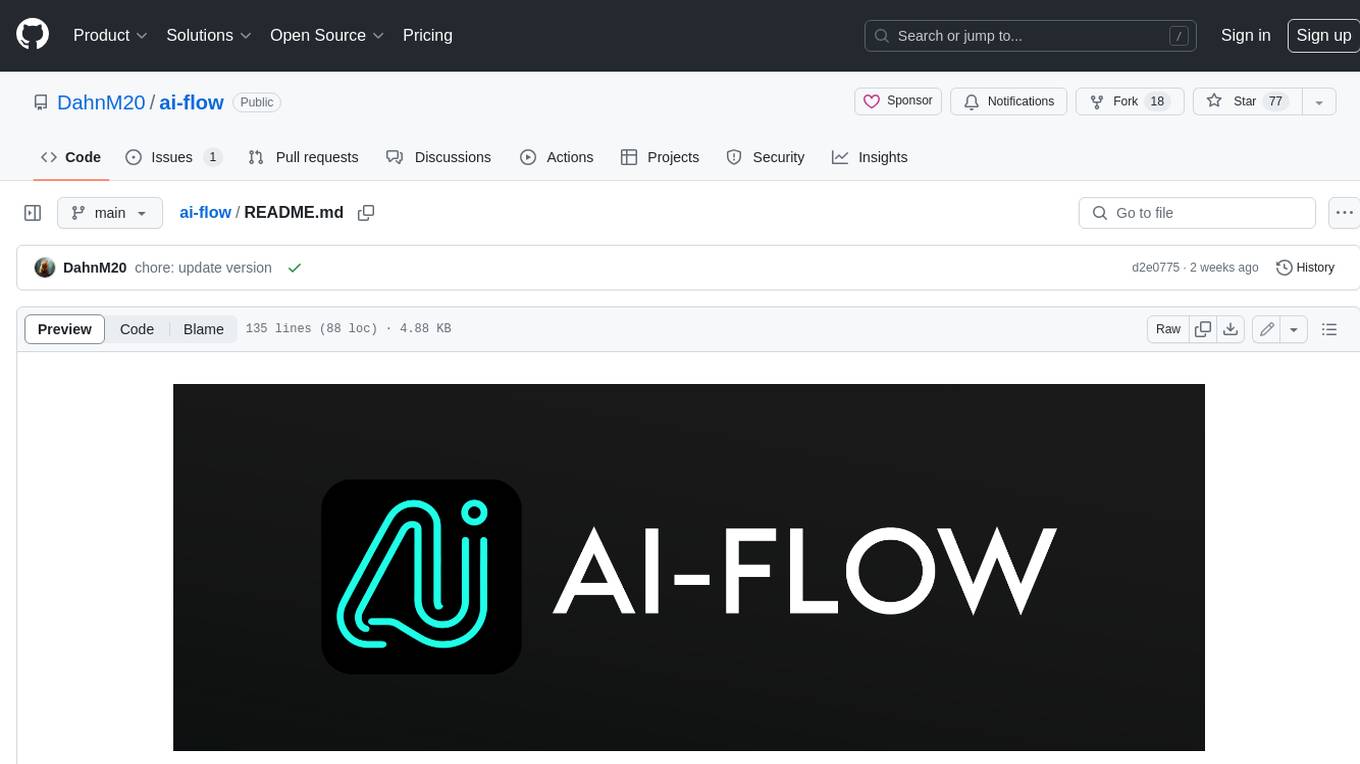
ai-flow
AI Flow is an open-source, user-friendly UI application that empowers you to seamlessly connect multiple AI models together, specifically leveraging the capabilities of multiples AI APIs such as OpenAI, StabilityAI and Replicate. In a nutshell, AI Flow provides a visual platform for crafting and managing AI-driven workflows, thereby facilitating diverse and dynamic AI interactions.
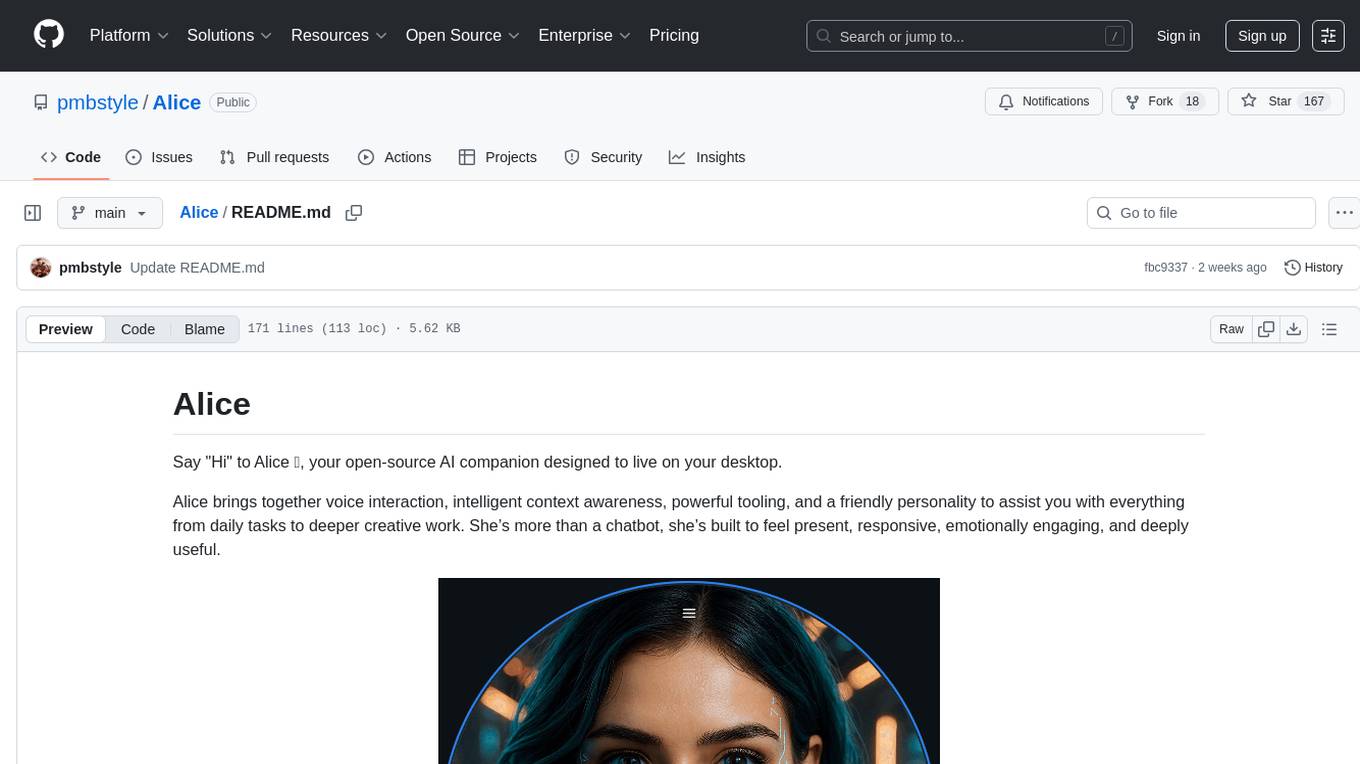
Alice
Alice is an open-source AI companion designed to live on your desktop, providing voice interaction, intelligent context awareness, and powerful tooling. More than a chatbot, Alice is emotionally engaging and deeply useful, assisting with daily tasks and creative work. Key features include voice interaction with natural-sounding responses, memory and context management, vision and visual output capabilities, computer use tools, function calling for web search and task scheduling, wake word support, dedicated Chrome extension, and flexible settings interface. Technologies used include Vue.js, Electron, OpenAI, Go, hnswlib-node, and more. Alice is customizable and offers a dedicated Chrome extension, wake word support, and various tools for computer use and productivity tasks.
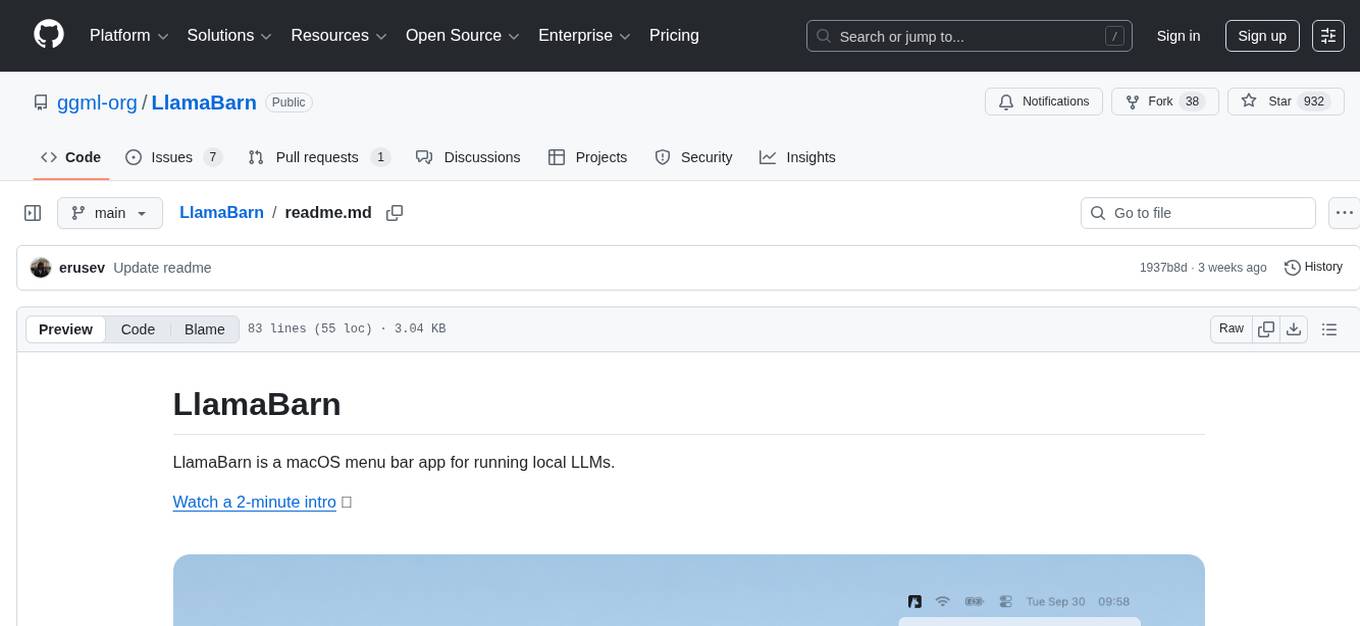
LlamaBarn
LlamaBarn is a macOS menu bar app designed for running local LLMs. It allows users to install models from a built-in catalog, connect various applications such as chat UIs, editors, CLI tools, and scripts, and manage the loading and unloading of models based on usage. The app ensures all processing is done locally on the user's device, with a small app footprint and zero configuration required. It offers a smart model catalog, self-contained storage for models and configurations, and is built on llama.cpp from the GGML org.
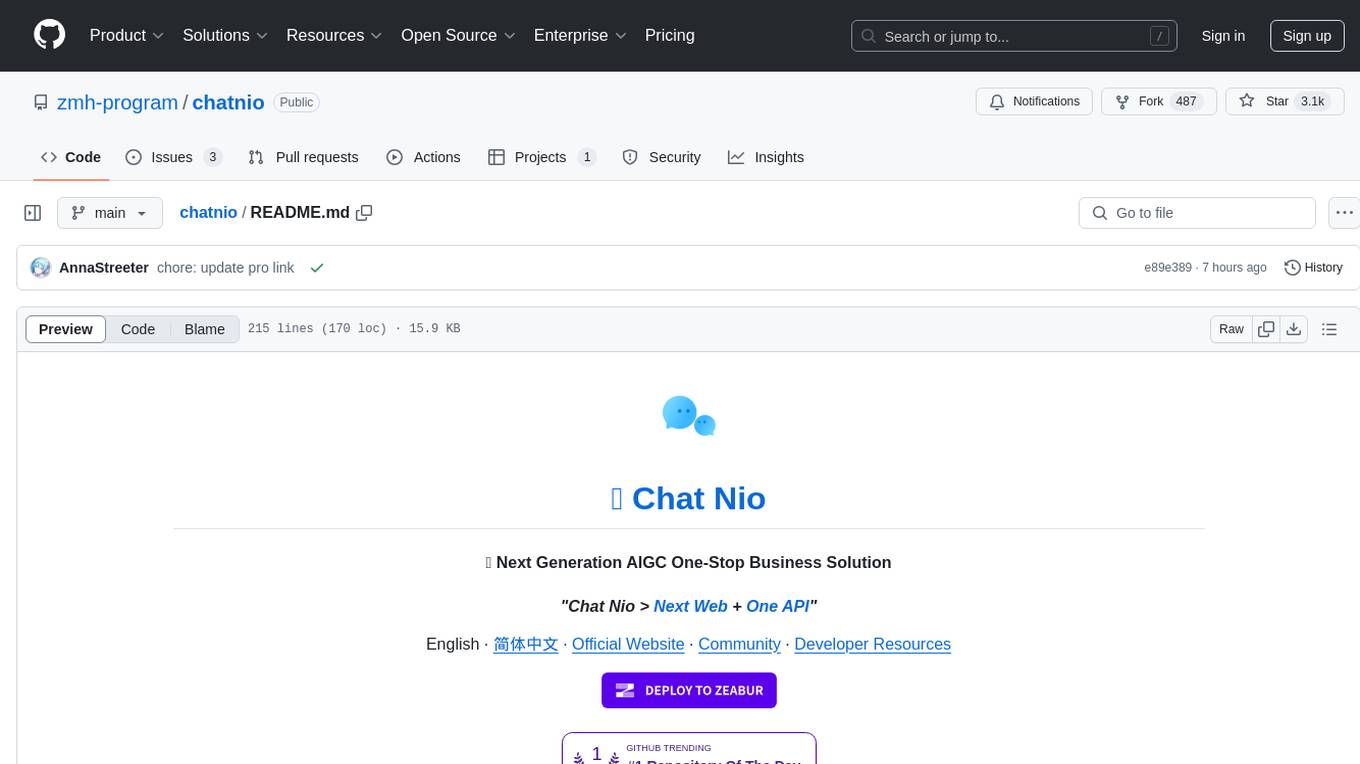
chatnio
Chat Nio is a next-generation AIGC one-stop business solution that combines the advantages of frontend-oriented lightweight deployment projects with powerful API distribution systems. It offers rich model support, beautiful UI design, complete Markdown support, multi-theme support, internationalization support, text-to-image support, powerful conversation sync, model market & preset system, rich file parsing, full model internet search, Progressive Web App (PWA) support, comprehensive backend management, multiple billing methods, innovative model caching, and additional features. The project aims to address limitations in conversation synchronization, billing, file parsing, conversation URL sharing, channel management, and API call support found in existing AIGC commercial sites, while also providing a user-friendly interface design and C-end features.
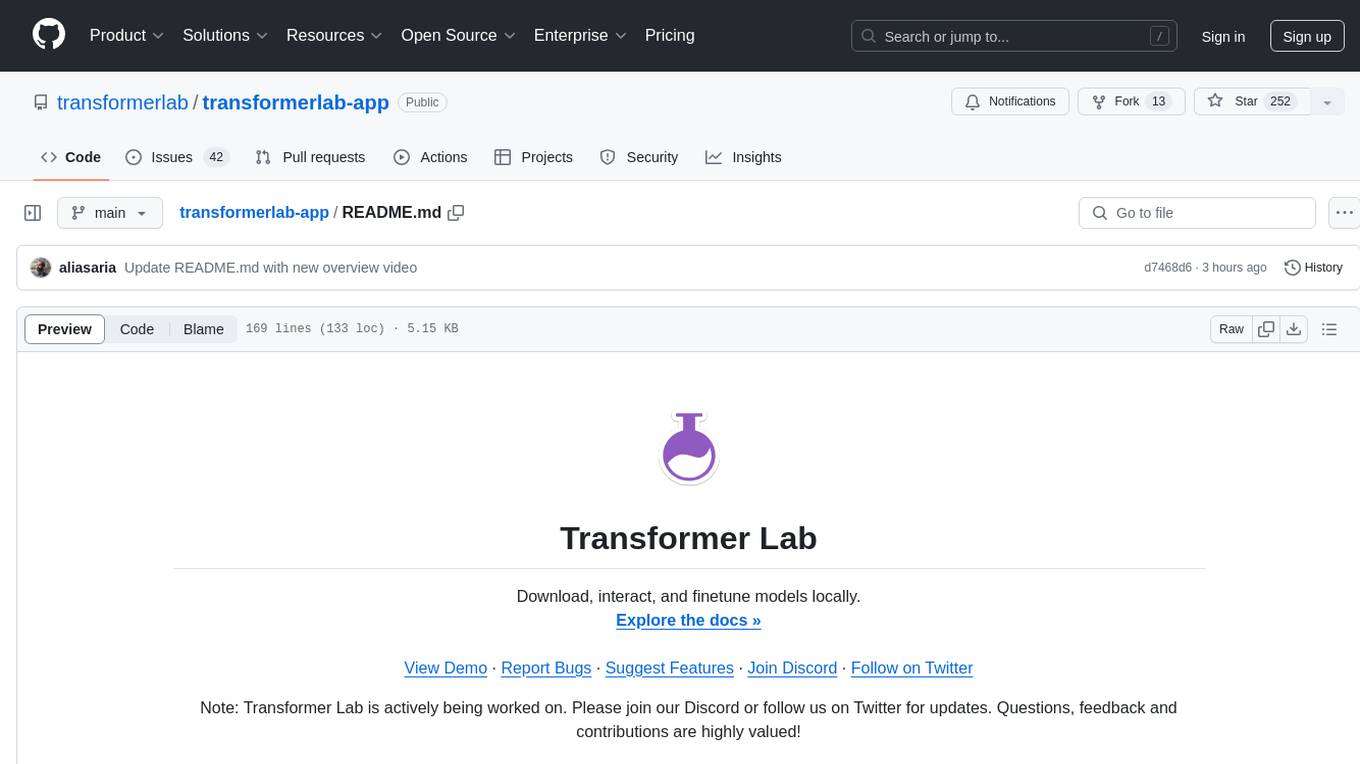
transformerlab-app
Transformer Lab is an app that allows users to experiment with Large Language Models by providing features such as one-click download of popular models, finetuning across different hardware, RLHF and Preference Optimization, working with LLMs across different operating systems, chatting with models, using different inference engines, evaluating models, building datasets for training, calculating embeddings, providing a full REST API, running in the cloud, converting models across platforms, supporting plugins, embedded Monaco code editor, prompt editing, inference logs, all through a simple cross-platform GUI.
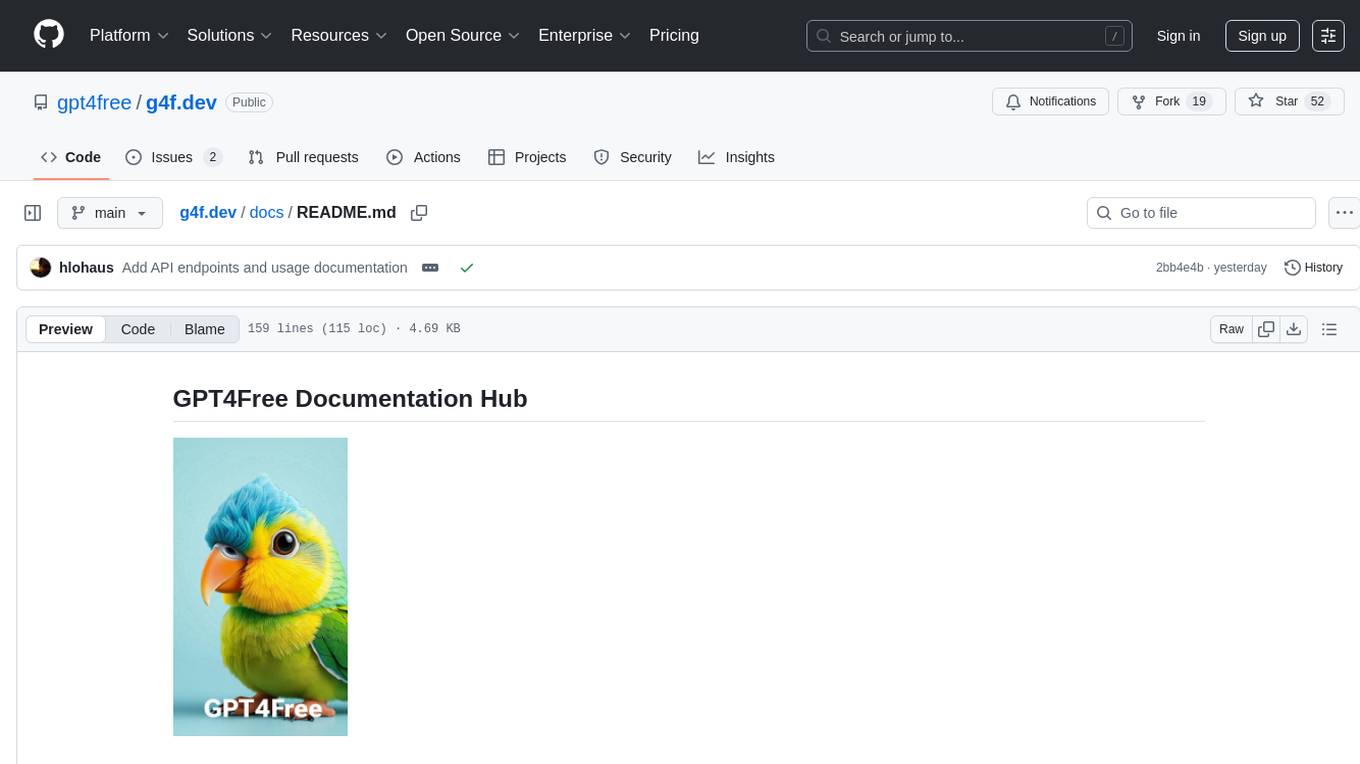
g4f.dev
G4f.dev is the official documentation hub for GPT4Free, a free and convenient AI tool with endpoints that can be integrated directly into apps, scripts, and web browsers. The documentation provides clear overviews, quick examples, and deeper insights into the major features of GPT4Free, including text and image generation. Users can choose between Python and JavaScript for installation and setup, and can access various API endpoints, providers, models, and client options for different tasks.
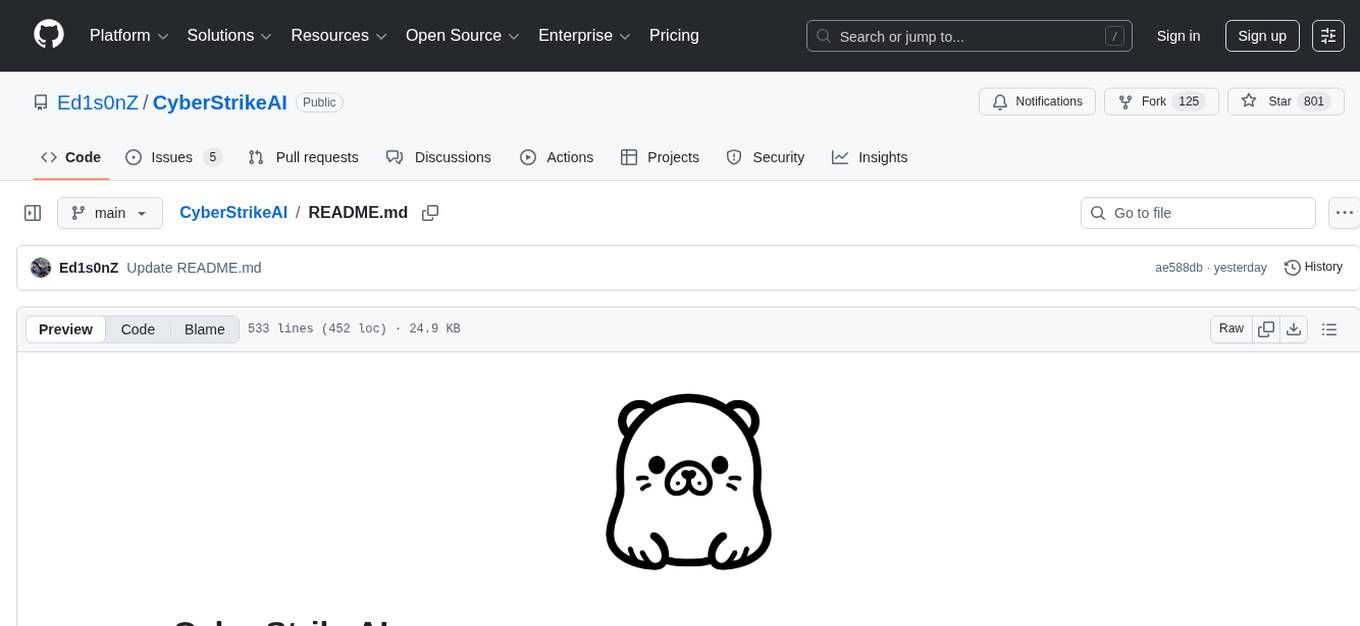
CyberStrikeAI
CyberStrikeAI is an AI-native security testing platform built in Go that integrates 100+ security tools, an intelligent orchestration engine, role-based testing with predefined security roles, a skills system with specialized testing skills, and comprehensive lifecycle management capabilities. It enables end-to-end automation from conversational commands to vulnerability discovery, attack-chain analysis, knowledge retrieval, and result visualization, delivering an auditable, traceable, and collaborative testing environment for security teams. The platform features an AI decision engine with OpenAI-compatible models, native MCP implementation with various transports, prebuilt tool recipes, large-result pagination, attack-chain graph, password-protected web UI, knowledge base with vector search, vulnerability management, batch task management, role-based testing, and skills system.
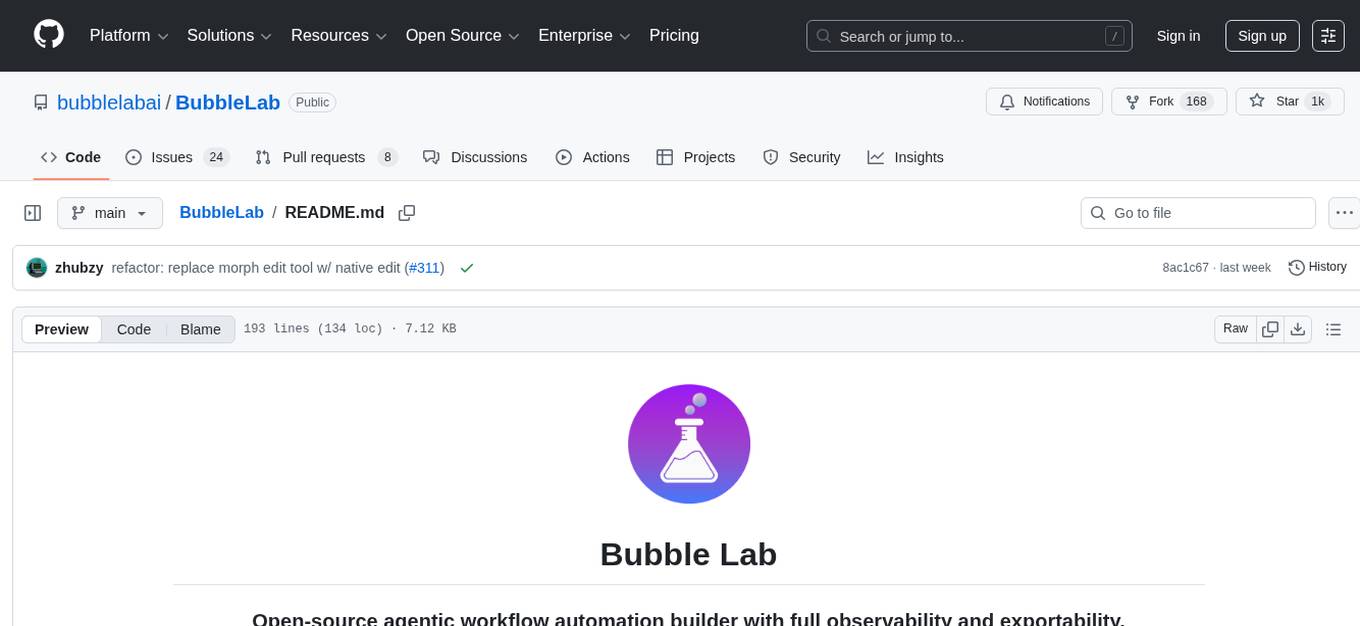
BubbleLab
Bubble Lab is an open-source agentic workflow automation builder designed for developers seeking full control, transparency, and type safety. It compiles workflows into clean, production-ready TypeScript code that can be debugged and deployed anywhere. With features like natural language prompt to workflow generation, full observability, seamless migration from other platforms, and instant export as TypeScript/API, Bubble Lab offers a flexible and code-centric approach to workflow automation.
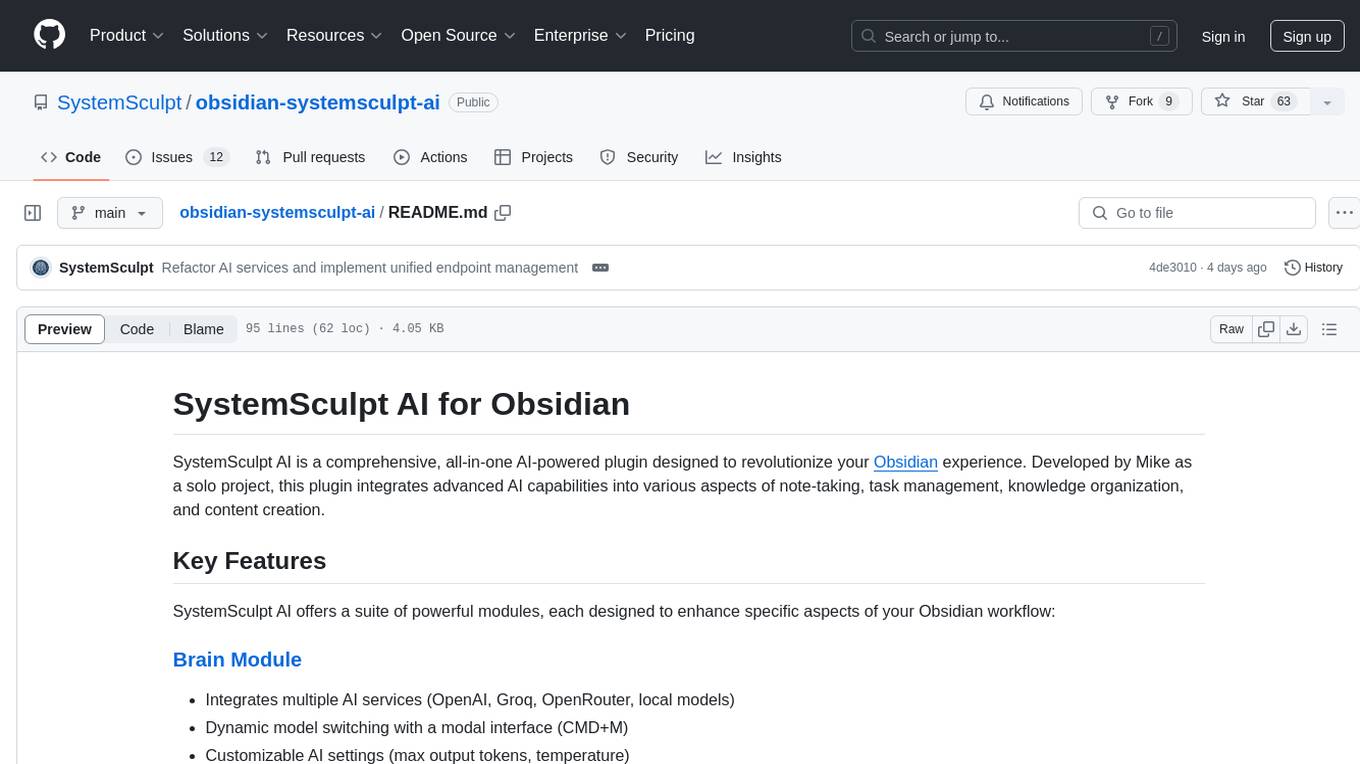
obsidian-systemsculpt-ai
SystemSculpt AI is a comprehensive AI-powered plugin for Obsidian, integrating advanced AI capabilities into note-taking, task management, knowledge organization, and content creation. It offers modules for brain integration, chat conversations, audio recording and transcription, note templates, and task generation and management. Users can customize settings, utilize AI services like OpenAI and Groq, and access documentation for detailed guidance. The plugin prioritizes data privacy by storing sensitive information locally and offering the option to use local AI models for enhanced privacy.
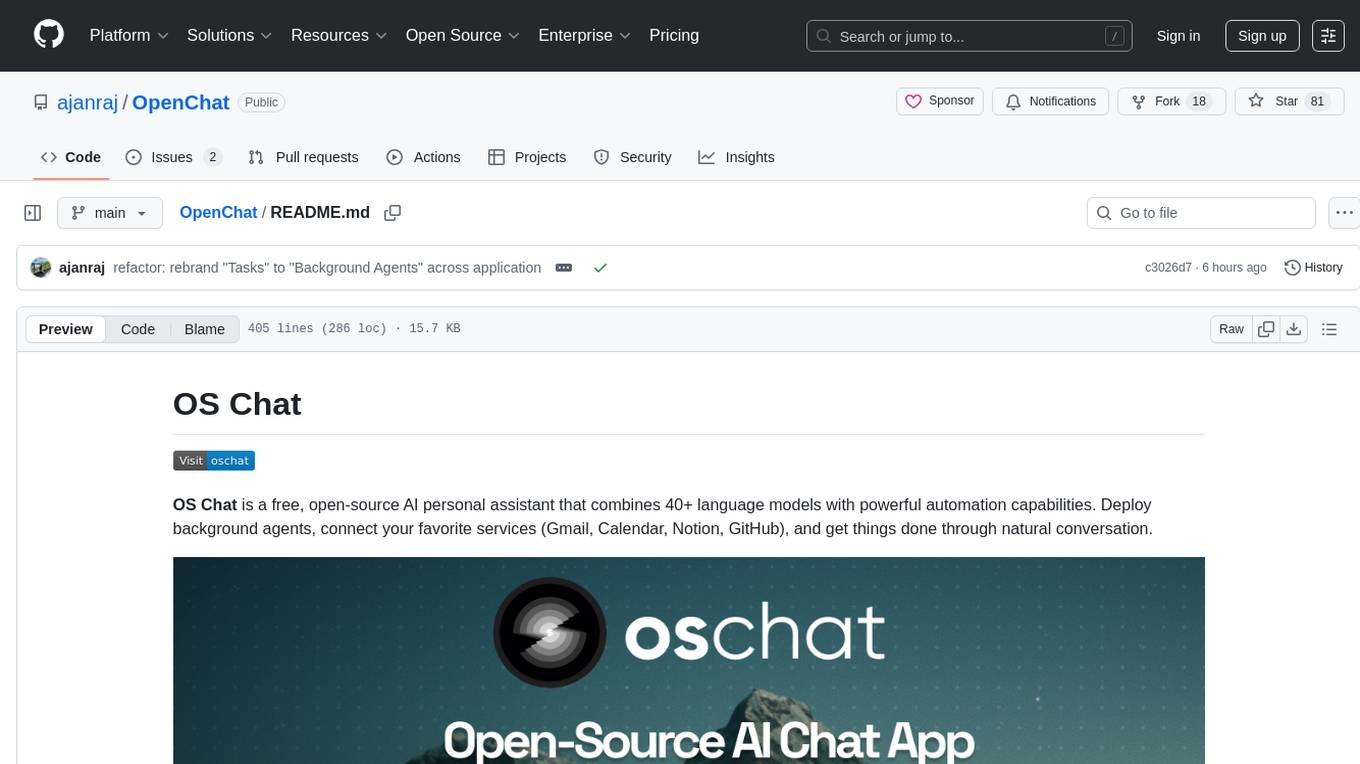
OpenChat
OS Chat is a free, open-source AI personal assistant that combines 40+ language models with powerful automation capabilities. It allows users to deploy background agents, connect services like Gmail, Calendar, Notion, GitHub, and Slack, and get things done through natural conversation. With features like smart automation, service connectors, AI models, chat management, interface customization, and premium features, OS Chat offers a comprehensive solution for managing digital life and workflows. It prioritizes privacy by being open source and self-hostable, with encrypted API key storage.
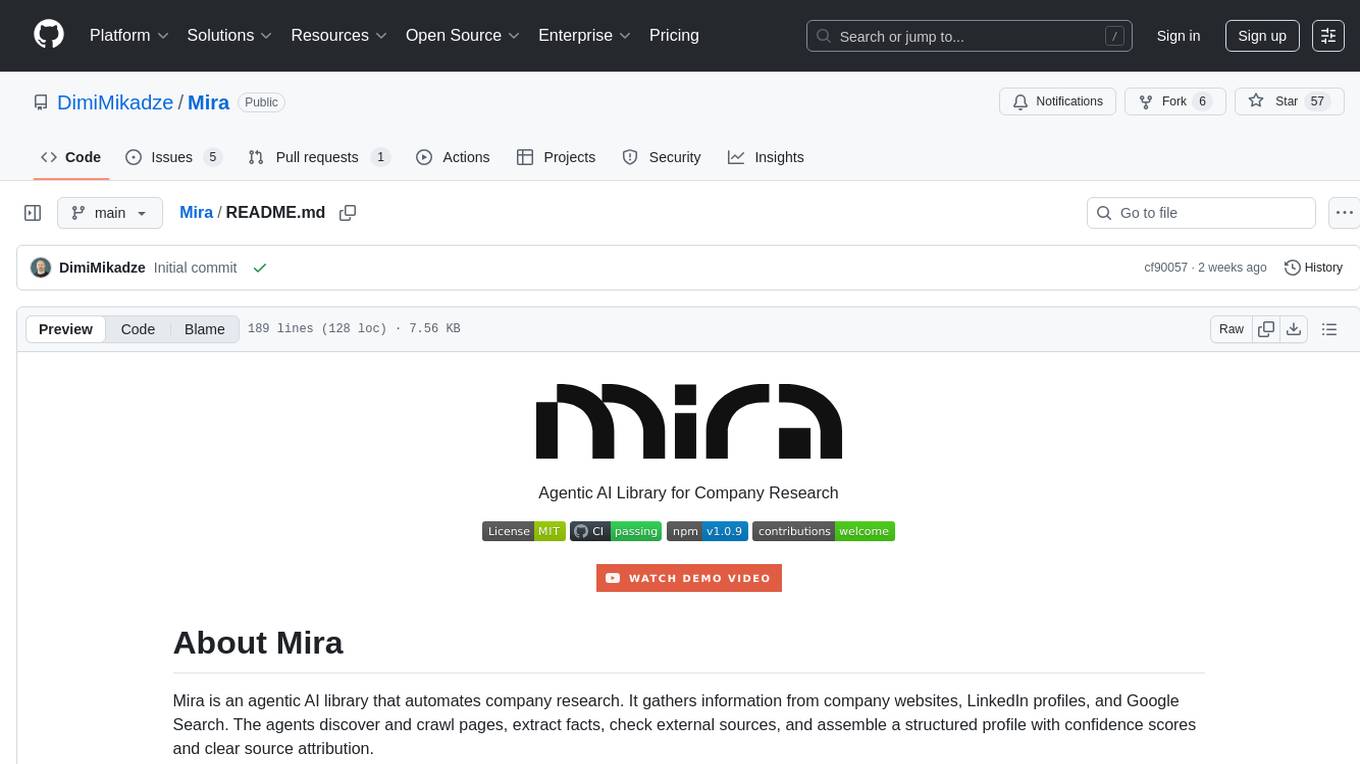
Mira
Mira is an agentic AI library designed for automating company research by gathering information from various sources like company websites, LinkedIn profiles, and Google Search. It utilizes a multi-agent architecture to collect and merge data points into a structured profile with confidence scores and clear source attribution. The core library is framework-agnostic and can be integrated into applications, pipelines, or custom workflows. Mira offers features such as real-time progress events, confidence scoring, company criteria matching, and built-in services for data gathering. The tool is suitable for users looking to streamline company research processes and enhance data collection efficiency.
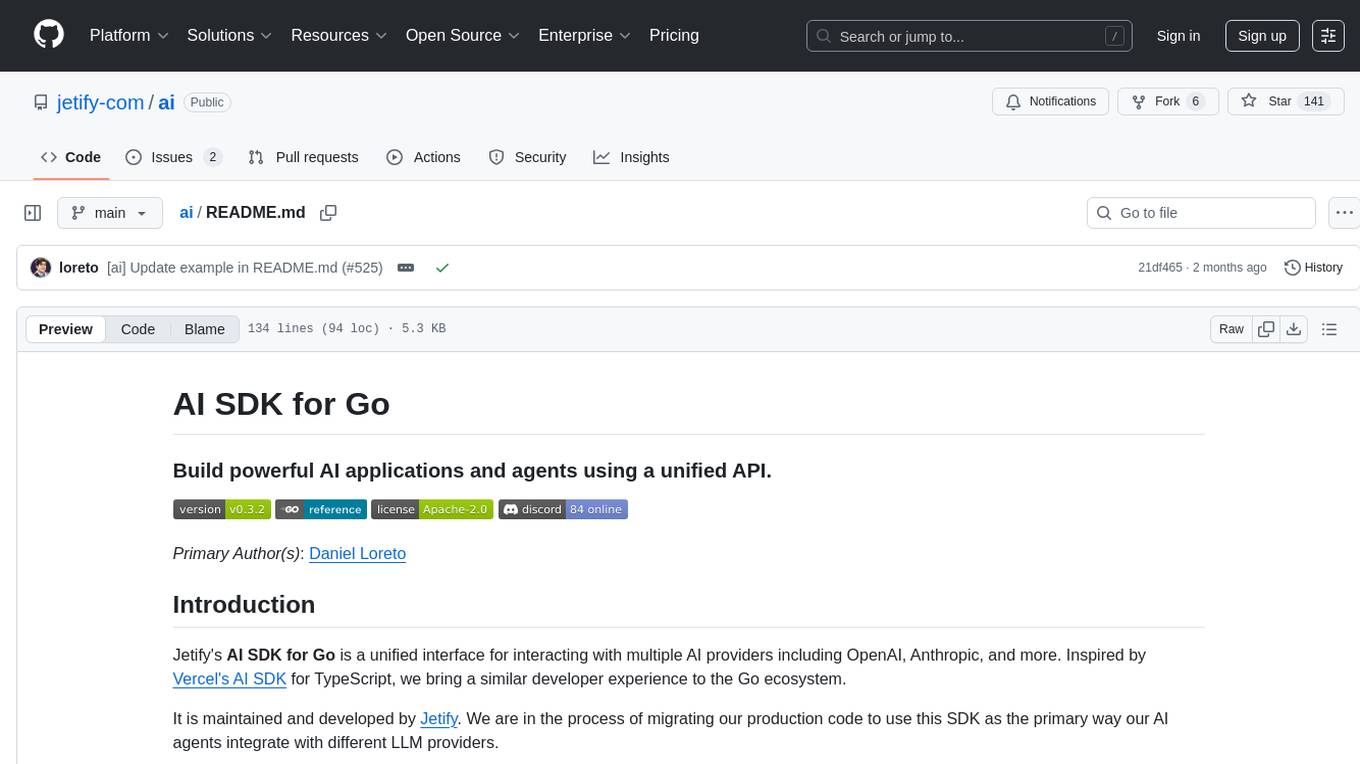
ai
Jetify's AI SDK for Go is a unified interface for interacting with multiple AI providers including OpenAI, Anthropic, and more. It addresses the challenges of fragmented ecosystems, vendor lock-in, poor Go developer experience, and complex multi-modal handling by providing a unified interface, Go-first design, production-ready features, multi-modal support, and extensible architecture. The SDK supports language models, embeddings, image generation, multi-provider support, multi-modal inputs, tool calling, and structured outputs.
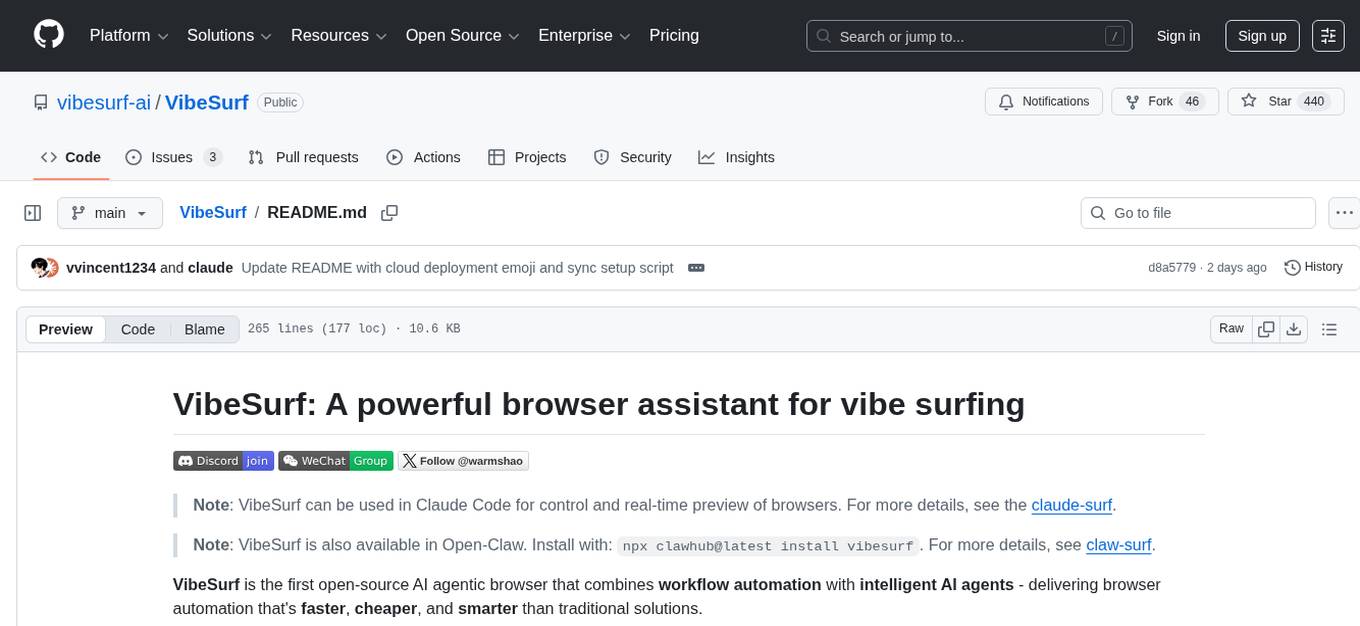
VibeSurf
VibeSurf is an open-source AI agentic browser that combines workflow automation with intelligent AI agents, offering faster, cheaper, and smarter browser automation. It allows users to create revolutionary browser workflows, run multiple AI agents in parallel, perform intelligent AI automation tasks, maintain privacy with local LLM support, and seamlessly integrate as a Chrome extension. Users can save on token costs, achieve efficiency gains, and enjoy deterministic workflows for consistent and accurate results. VibeSurf also provides a Docker image for easy deployment and offers pre-built workflow templates for common tasks.
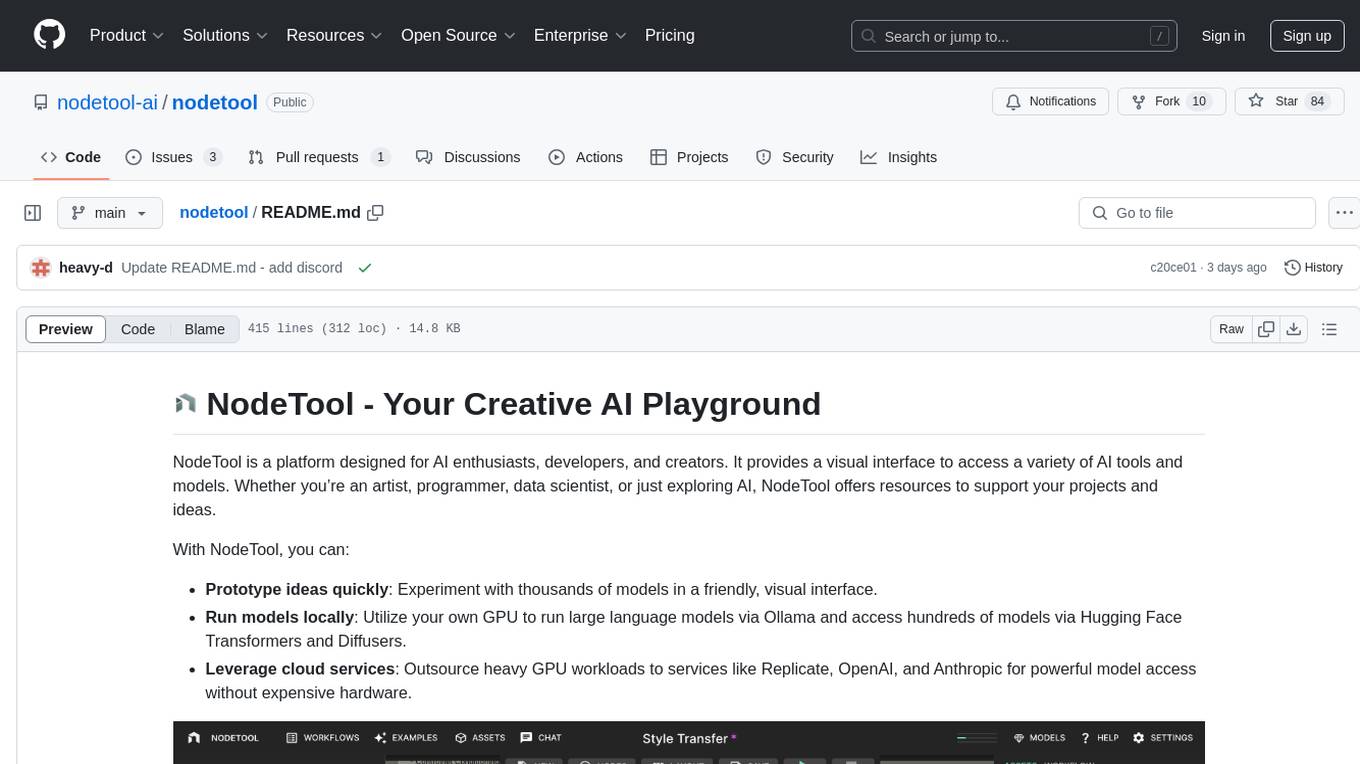
nodetool
NodeTool is a platform designed for AI enthusiasts, developers, and creators, providing a visual interface to access a variety of AI tools and models. It simplifies access to advanced AI technologies, offering resources for content creation, data analysis, automation, and more. With features like a visual editor, seamless integration with leading AI platforms, model manager, and API integration, NodeTool caters to both newcomers and experienced users in the AI field.
For similar tasks

orbit
ORBIT (Open Retrieval-Based Inference Toolkit) is a middleware platform that provides a unified API for AI inference. It acts as a central gateway, allowing you to connect various local and remote AI models with your private data sources like SQL databases, vector stores, and local files. ORBIT uses a flexible adapter architecture to connect your data to AI models, creating specialized 'agents' for specific tasks. It supports scenarios like Knowledge Base Q&A and Chat with Your SQL Database, enabling users to interact with AI models seamlessly. The tool offers a RESTful API for programmatic access and includes features like authentication, API key management, system prompts, health monitoring, and file management. ORBIT is designed to streamline AI inference tasks and facilitate interactions between users and AI models.
For similar jobs

sweep
Sweep is an AI junior developer that turns bugs and feature requests into code changes. It automatically handles developer experience improvements like adding type hints and improving test coverage.

teams-ai
The Teams AI Library is a software development kit (SDK) that helps developers create bots that can interact with Teams and Microsoft 365 applications. It is built on top of the Bot Framework SDK and simplifies the process of developing bots that interact with Teams' artificial intelligence capabilities. The SDK is available for JavaScript/TypeScript, .NET, and Python.

ai-guide
This guide is dedicated to Large Language Models (LLMs) that you can run on your home computer. It assumes your PC is a lower-end, non-gaming setup.

classifai
Supercharge WordPress Content Workflows and Engagement with Artificial Intelligence. Tap into leading cloud-based services like OpenAI, Microsoft Azure AI, Google Gemini and IBM Watson to augment your WordPress-powered websites. Publish content faster while improving SEO performance and increasing audience engagement. ClassifAI integrates Artificial Intelligence and Machine Learning technologies to lighten your workload and eliminate tedious tasks, giving you more time to create original content that matters.

chatbot-ui
Chatbot UI is an open-source AI chat app that allows users to create and deploy their own AI chatbots. It is easy to use and can be customized to fit any need. Chatbot UI is perfect for businesses, developers, and anyone who wants to create a chatbot.

BricksLLM
BricksLLM is a cloud native AI gateway written in Go. Currently, it provides native support for OpenAI, Anthropic, Azure OpenAI and vLLM. BricksLLM aims to provide enterprise level infrastructure that can power any LLM production use cases. Here are some use cases for BricksLLM: * Set LLM usage limits for users on different pricing tiers * Track LLM usage on a per user and per organization basis * Block or redact requests containing PIIs * Improve LLM reliability with failovers, retries and caching * Distribute API keys with rate limits and cost limits for internal development/production use cases * Distribute API keys with rate limits and cost limits for students

uAgents
uAgents is a Python library developed by Fetch.ai that allows for the creation of autonomous AI agents. These agents can perform various tasks on a schedule or take action on various events. uAgents are easy to create and manage, and they are connected to a fast-growing network of other uAgents. They are also secure, with cryptographically secured messages and wallets.

griptape
Griptape is a modular Python framework for building AI-powered applications that securely connect to your enterprise data and APIs. It offers developers the ability to maintain control and flexibility at every step. Griptape's core components include Structures (Agents, Pipelines, and Workflows), Tasks, Tools, Memory (Conversation Memory, Task Memory, and Meta Memory), Drivers (Prompt and Embedding Drivers, Vector Store Drivers, Image Generation Drivers, Image Query Drivers, SQL Drivers, Web Scraper Drivers, and Conversation Memory Drivers), Engines (Query Engines, Extraction Engines, Summary Engines, Image Generation Engines, and Image Query Engines), and additional components (Rulesets, Loaders, Artifacts, Chunkers, and Tokenizers). Griptape enables developers to create AI-powered applications with ease and efficiency.







